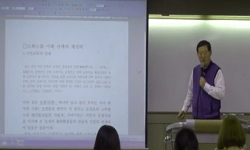This paper looks at the life of Manguwa Kim Jin-Kwi and his literature formed during his exile to Jeju Island. Manguwa, a member of Noron political group, was punished and exiled to Jeju Island. The punishment was made due to his involvement in persec...
http://chineseinput.net/에서 pinyin(병음)방식으로 중국어를 변환할 수 있습니다.
변환된 중국어를 복사하여 사용하시면 됩니다.
- 中文 을 입력하시려면 zhongwen을 입력하시고 space를누르시면됩니다.
- 北京 을 입력하시려면 beijing을 입력하시고 space를 누르시면 됩니다.
https://www.riss.kr/link?id=A102167484
- 저자
- 발행기관
- 학술지명
- 권호사항
-
발행연도
2016
-
작성언어
-
-
주제어
만구와 김진귀 ; 김만중 ; 김춘택 ; 기사환국 ; 제주유배 ; Manguwa ; Kim Jin-Gwi ; Kim Man-Joong ; Kim Chun-Taek ; Kisawhankook ; Exile to Jeju Island
-
KDC
800
-
등재정보
KCI등재
-
자료형태
학술저널
-
수록면
227-252(26쪽)
- DOI식별코드
- 제공처
-
0
상세조회 -
0
다운로드
부가정보
다국어 초록 (Multilingual Abstract)
This paper looks at the life of Manguwa Kim Jin-Kwi and his literature formed during his exile to Jeju Island. Manguwa, a member of Noron political group, was punished and exiled to Jeju Island. The punishment was made due to his involvement in persecuting the members of Namin political group during the period of King Sukjong when the political debates between Noron and Namin were severely made. During that period, Manguwa was exiled to Jeju Island, his brothers Kim Jin-Kyu and Kim Jin-Seo were to Gwoje-Do and Jin-do respectively; and his uncle Kim Man-Joong to Namhae-Do. The anthology of Manguwa, titled Manguwa Bukunyumun (晩求窩府君遺文), is located at the library of Chungnam National University. Of the anthology, this paper focuses upon the collection of poetry literature, Dochanillok (島竄日錄) and examines the change in Manguwa`s consciousness flow along the times. The very first emotional response found in Manguwa after the punishment of exile to Jeju Island relates to separation from his family members, friends, and colleagues in the mainland of Chosun. While Manguwa expressed sorry feelings towards family members, he showed a sentiment of self-courage to friends and colleagues. However, it is insecure feeling that runs deep through in his emotions. Manguwa was totally isolated after exiled to Jeju Island and intensive solitude feelings were grounded in his mentality, which was different from the separation he felt when coming down to Jeju Island. Separation is made possible at least with the interrelationships with counterparts, whereas solitude is made totally alone without counterparts. His solitude was exacerbated with the events of his mother`s birthday, his uncle`s death and some other small and big things happened to his family members. However, it is far from that Manguwa only fell down to desperation in the land of exile, Jeju Island. He looked his exiled situation in the face and perceived himself with a critical insight. Forming friendships with the intellectuals of Jeju Island, educating them, and considering the ordinary people of Jeju Island with loving minds were all made possible with the interactions of other individuals in Jeju Island. What enables Manguwa to form relationships with people in Jeju Island is his renewed perceptions about himself. The change in his perceptions about himself became an energy to create new self and to overcome the downturn by the punishment of exile to Jeju Island.
동일학술지(권/호) 다른 논문
-
- 근역한문학회
- 김하라 ( Kim Ha-ra )
- 2016
- KCI등재
-
거듭나기 과정으로서의 질병 -한국한문학이 포착한 질병의 한 특징-
- 근역한문학회
- 이홍식 ( Lee Hong-shik )
- 2016
- KCI등재
-
자기 자신을 돌보기, 돌아보기로서 병(病)의 기록 -침로숭(沈魯崇)의 병(病)에 관련된 서사(敍事)를 중심으로-
- 근역한문학회
- 안득용 ( An Deuk-yong )
- 2016
- KCI등재
-
야은(冶隱) 길재(吉再)에 대(對)한 력대(歷代) 찬영시(讚詠詩) 검토(檢討)(Ⅲ) -숙종(肅宗) 어제시(御製詩) 및 갱진(?進)·차운시(次韻詩) 중심(中心)으로-
- 근역한문학회
- 남재철 ( Nam Jae-cheol )
- 2016
- KCI등재





 KCI
KCI KISS
KISS


